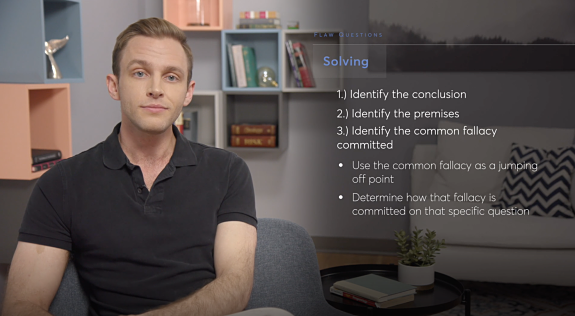
You have questions, we all do. Especially if you’re preparing for the LSAT. The LSAT makes naive fawns of us all, as we take our first timid steps into some LSAT prep program. So you have some questions about how to prepare for the LSAT, or how to make the most of one of our prep programs. Now, some of your questions are so common that they become “frequently asked questions.” Today’s blog will address some of the less common, but still fairly common, questions we didn’t have a chance to address on our site. Call this our FEAQs (Frequently Enough Asked Questions).
1. Should I take notes while watching videos for an online LSAT course?
This is a question that’s been coming over our transom quite a bit. Many LSAT prep programs have placed a greater emphasis on online courses recently, both to account for the new(-ish)ly digital LSAT and students’ busy lives and aversion to long commutes. For students whose academic careers took place exclusively in classrooms, watching live recorded lessons or on-demand lesson videos at home could feel a bit like a strange new learning environment. And, perhaps as a result, many are unsure whether they should even take notes while watching these videos. So, they ask, “Should I take notes while watching these online videos?”
We recommend using whatever technique you used successfully in other, more traditional learning environments. For many of us, we take notes to keep engaged, get all the important parts of the lesson in writing, and confirm that we understand what the instructor is even talking about us. For others, we sit there and let the words of lesson wash over us, confident that we’ll be able to remember the important bits later. So use your preferred technique if you go with online LSAT prep. The pedagogy — fancy word for “teaching methods,” if you’d like to jot down a note and use that later — of online prep isn’t much different than that of a classroom course. So whatever worked for you in a classroom will also work in an online course.
That said, for the LSAT, we strongly recommend taking notes, whether the class is in person or online. Improving on the LSAT involves learning a few important concepts and practicing a few sound strategies, both of which will help you answer any LSAT question. Most people need to take notes on what these concepts and strategies entail to effectively employ them in their practice outside of the lessons. Our on-demand lesson videos, by the way, use on-screen text to make very clear what notes you should be taking down. You can get a sneak peak at these videos by signing up for a free trial here.

2. Will I do better if I do a traditional in-person classroom course?
Here’s another one we get about online prep a lot. Many people considering taking either our live course or on-demand online courses are concerned that they may not increase their LSAT score as dramatically.
We’ve monitored — and we continue to monitor — the success of our students in all of our courses. It’s a lot of data to process.
And, having crunched the numbers, we found the biggest predictor of dramatic score increases was student engagement. The more LSAT questions you can complete during the course, the better chance you have make a huge score leap. And all of our courses — our live course, 170+ course and on-demand online course — will give you access to every LSAT question ever published.
3. When should I start prepping for the LSAT?
No matter how people choose to study for the LSAT, we hear a lot of questions about how long the study process should take. For most people, studying for the LSAT is a two-to-four-month endeavor. That’s why we made most of our classes run for two to four months.
But it all depends. Some people who are trying to make a minor score leap can get away for studying for a month. Some people trying to make a huge score jump might take longer than four months.
We recommend starting your studies with a practice exam. Go into that practice exam completely cold. The score you receive, and how close or far that score is from the score you’d like to receive on the actual exam, will give you a sense of how long you’ll need to study. For those who might need a study plan that’s either longer or shorter than the typical two-to-four-month duration, we strongly recommend our self-paced course, which allows you to customize your study plan to make it as long or as short as you’d like.
4. Do I really need to do daily homework and drills?
We’ll make this answer short. Yes.
Now here’s a longer version of that answer. Absolutely yes. Unequivocally yes.
Remember, when we said the students who do the most questions give themselves the best shot at making a major score increase? The daily homework is how you’ll do more of those questions. And remember when we said that improving on the LSAT also involves learning a few important concepts and practicing a few sound strategies? The drills, which are part of Blueprint’s homework curriculum, is where you’ll confirm that you understand those concepts and strategies.
5. What if my first LSAT practice exam score is really low?
Well, first of all, we’re relativists at Blueprint. We don’t think there’s any such thing as a “low” practice exam score. Your score is either relatively close to the score you eventually want to get on the real test, or it’s relatively far away from the score you eventually want to get on the real test. This may feel like a distinction without a difference to you, but we’ve found that getting rid of inherently negative, self-defeating terms like “low” or “bad” when discussing your LSAT performance can go a long way in making the experience of studying for the LSAT less self-esteem destroying.
As we alluded to earlier, if your first practice exam score is far away from the score you’d eventually like to eventually receive, you may need to adjust your study plan. There are a few very important checkpoints you’ll have to reach during your studies. Learning the strategies backwards and forwards is going to be super important to your progress. Taking the time to slowly and incrementally speed up will be another crucial step. And then the last step will involve taking many practice exams to practice testing strategies and monitor the areas you still need to review. These things take time — they certainly can be accomplished in a two-to-four month period, but they may take a little longer.
If you’ve taken a practice exam and want to develop a plan of attack for yourself, you can schedule a time to speak with one of our experienced Academic Managers here.
6. If LSAC is promoting Khan Academy, does that mean it’s the best way to prep for the LSAT?
The Law School Admissions Council — LSAC for short, they write and administer the LSAT — partnered with Khan Academy to create a free online LSAT prep program. They launched the program in June of 2018. And they continue to promote the program — there’ll even be a link to the program available to you when you register for the LSAT.
Since Khan Academy is being promoted as the “Official” LSAT prep program from the sacrosanct halls of the Law School Admissions Council, some have the impression that it’s the best way to prepare for the LSAT. That the Khan Academy is where the test writers divulged all the secrets to mastering the LSAT. Is that the case?
Well, it’s very difficult — perhaps impossible — for me to give an unbiased answer. But I can say with total confidence that the Khan Academy is not where LSAC divulged all the secrets to mastering the LSAT. I can say that because there are no such secrets. Mastering the LSAT, as we’ve said, involves learning, developing, and refining a series of skills and strategies. There isn’t a secret cheat code that can be revealed, unfortunately for us all.
I can also speak a little bit about my experience with Khan Academy. When it launched, I made an account and tried it out. Overall, I felt that it definitely had some pros, but also some … Khans (very sorry). It had me start with a practice exam — as any prep program worth its salt should — and I arbitrarily answered some questions correctly and some incorrectly. After the test, the program had a few suggestions for where I should begin my studies. Given my score, I needed a lot of help. But Khan Academy recommended I prioritize learning how to do “Role questions.” Your performance Role questions will account for about 1-2% of your overall LSAT score, so I wasn’t sure why this should be my priority. You can’t make a huge improvement to your LSAT score simply by mastering Role questions, so I felt this suggestion could be misleading to some students.
If you didn’t want to follow its suggestions, Khan Academy also presented a comprehensive course that takes you from the basics of the LSAT to its more advanced elements. There were text and video explanations for most parts of the LSAT. Some of these explanations had great pointers; others provided pointers I really didn’t think were helpful. All of it seemed a little bare bones and … I don’t want to say boring, so I will say a kinder word than boring … dry.
Overall, I think the availability of free LSAT prep is an important and necessary part of this LSAT industry. I’ve spilled thousands upon thousands of words that provided free LSAT advice on this blog — I feel strongly about providing a little free LSAT help to the public. But is Khan Academy the best way to prep for the LSAT? We’d encourage you to check it out and compare it to the other programs on the market, and make your own decision.
Want to start with our prep for free? Get our free LSAT practice test, course sample, LSAT study planner and more.




